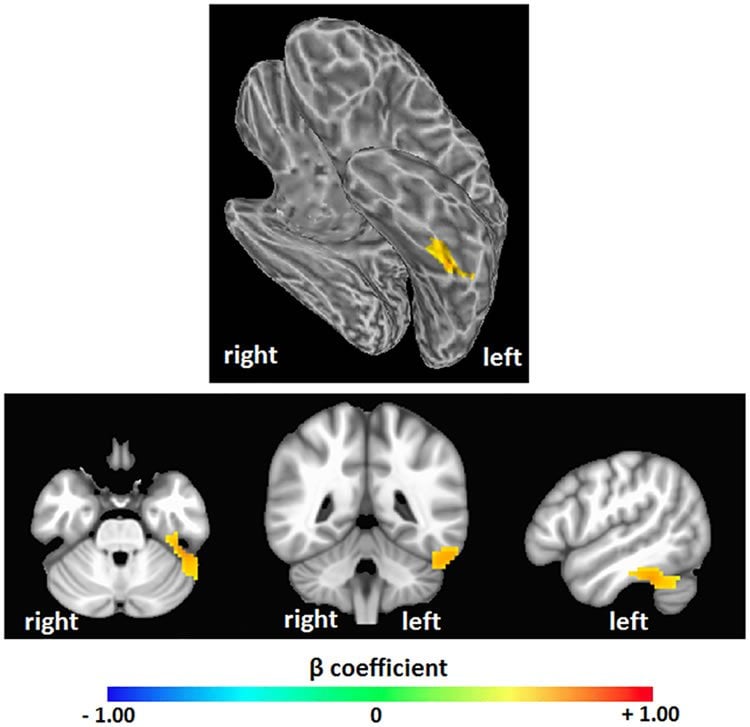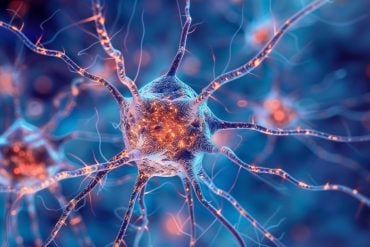Summary: Neuroimaging technology has allowed researchers to measure brain entropy. Researchers report greater entropy is linked to more versatile information processing.
Source: NYU Langone.
High-tech scans of the resting human brain can provide a new way to define and interpret the brain’s actual mental capacity, new research suggests.
In a report published in the journal PLOS ONE online Feb. 12, NYU School of Medicine researchers used a specialized imaging technology to measure patients’ brains for entropy, the variety of nerve circuits used to interpret the surrounding world.
Part of theories on human consciousness, the concept of entropy has become a greater research focus with recent improvements in the ability of functional magnetic resonance imaging (fMRI) to track chemical activity patterns in the brain.
By analyzing fMRI images in every region of the brains in 892 American men and women, the study authors linked greater entropy to more versatile processing of information. This is considered a key aspect of intelligence, researchers say, because of the large volume of sensory information coming into the brain from its environment.
“Our study offers the first solid evidence that functional MRI scans of brain entropy are a new means to understanding human intelligence,” says study lead investigator Glenn Saxe, MD, a professor in child and adolescent psychiatry at NYU School of Medicine and a member of NYU Langone Health’s Neuroscience Institute.
“Human intelligence is so meaningful because it is about the capacity to understand whatever may come, when there is no way beforehand to know what may come,” says Saxe. “So, an intelligent brain has to be flexible in the number of possible ways its nerve cells, or neurons, may be rearranged. And that is what entropy is all about.”
If further research proves successful, Saxe predicts that fMRI scans of brain entropy could one day help in assessing problems in brain function in people with depression, post-traumatic stress disorder, or autism, in which processing information becomes difficult.
Functional MRI scans use magnetic fields and radio waves to measure subtle changes in blood flow to detect which brain cells and circuits are active or inactive.
As part of the new study, people were tested when their brains and minds were resting (not unengaged in a particular task) to get a base reading. Study participants had their brains imaged as they enrolled in the Harvard-based Brain Genomics Superstruct study over the last decade, with the stored images forming the foundation of the NYU team’s analysis.

Researchers compared hundreds of fMRI scans taken milliseconds apart. The scans revealed the number of possible combinations of electrically active brain cells available to interact with each other in specific regions of the brain.
The research team then used mathematical models validated by past studies to arrive at reliable, statistical entropy scores based on how well one set of active nerve-cell combinations captured by one image predicted those in the next image. Experts say the activity level of the estimated 100 billion neurons in the brain depends on how much sensory information is being processed at any instant, with many often inactive.
Scientists next compared their statistical measures of relatively higher or lower entropy with participants’ scores on two standard IQ tests: the Shipley-Hartford test, which gauges verbal skills, and the Wechsler test, which assesses problem-solving abilities.
If brain entropy could offer useful insight into intelligence, Saxe proposed, then it should track closely with IQ scores.
People with average intelligence have an IQ score of about 100, Saxe says, with current study participants having an above-average IQ, at 108.
According to Saxe, study participants’ entropy scores were strongly tied to IQ. Using standard statistical techniques that were performed two different ways to ensure accuracy, the researchers found that higher entropy was significantly related to the brain regions where previous research has shown it matters most. Entropy scores closely matched IQ scores from the Shipley-Hartford test for the left side of the middle brain (the left inferior temporal lobe), which is tied to learning speech. Similarly, entropy scores tracked closely with those from the Wechsler test for the front region of the brain (bilateral anterior frontal lobes), a known center for organization, planning, and emotional control.
Funding: Funding support for the study, which took over a year to complete, was provided by NYU and by Harvard University. In addition to Saxe, other NYU Langone scientists involved in this research were Daniel Calderone, PhD; and Leah Morales, BS.
Source: Gregory Williams – NYU Langone
Publisher: Organized by NeuroscienceNews.com.
Image Source: NeuroscienceNews.com image is credited to Saxe et al./PLOS ONE.
Original Research: Open access research in PLOS ONE.
doi:10.1371/journal.pone.0191582
[cbtabs][cbtab title=”MLA”]NYU Langone “Brain Imaging Helps Redefine Intelligence.” NeuroscienceNews. NeuroscienceNews, 14 February 2018.
<https://neurosciencenews.com/neuroimaging-intelligence-8486/>.[/cbtab][cbtab title=”APA”]NYU Langone (2018, February 14). Brain Imaging Helps Redefine Intelligence. NeuroscienceNews. Retrieved February 14, 2018 from https://neurosciencenews.com/neuroimaging-intelligence-8486/[/cbtab][cbtab title=”Chicago”]NYU Langone “Brain Imaging Helps Redefine Intelligence.” https://neurosciencenews.com/neuroimaging-intelligence-8486/ (accessed February 14, 2018).[/cbtab][/cbtabs]
Abstract
Brain entropy and human intelligence: A resting-state fMRI study
Human intelligence comprises comprehension of and reasoning about an infinitely variable external environment. A brain capable of large variability in neural configurations, or states, will more easily understand and predict variable external events. Entropy measures the variety of configurations possible within a system, and recently the concept of brain entropy has been defined as the number of neural states a given brain can access. This study investigates the relationship between human intelligence and brain entropy, to determine whether neural variability as reflected in neuroimaging signals carries information about intellectual ability. We hypothesize that intelligence will be positively associated with entropy in a sample of 892 healthy adults, using resting-state fMRI. Intelligence is measured with the Shipley Vocabulary and WASI Matrix Reasoning tests. Brain entropy was positively associated with intelligence. This relation was most strongly observed in the prefrontal cortex, inferior temporal lobes, and cerebellum. This relationship between high brain entropy and high intelligence indicates an essential role for entropy in brain functioning. It demonstrates that access to variable neural states predicts complex behavioral performance, and specifically shows that entropy derived from neuroimaging signals at rest carries information about intellectual capacity. Future work in this area may elucidate the links between brain entropy in both resting and active states and various forms of intelligence. This insight has the potential to provide predictive information about adaptive behavior and to delineate the subdivisions and nature of intelligence based on entropic patterns.







